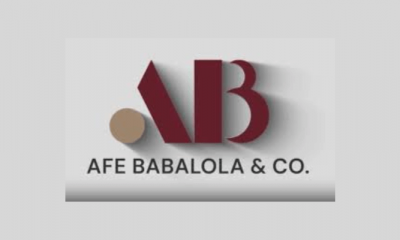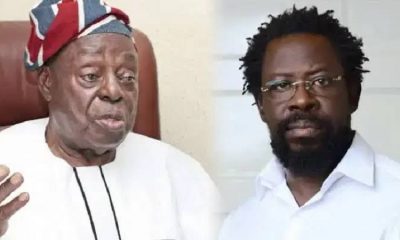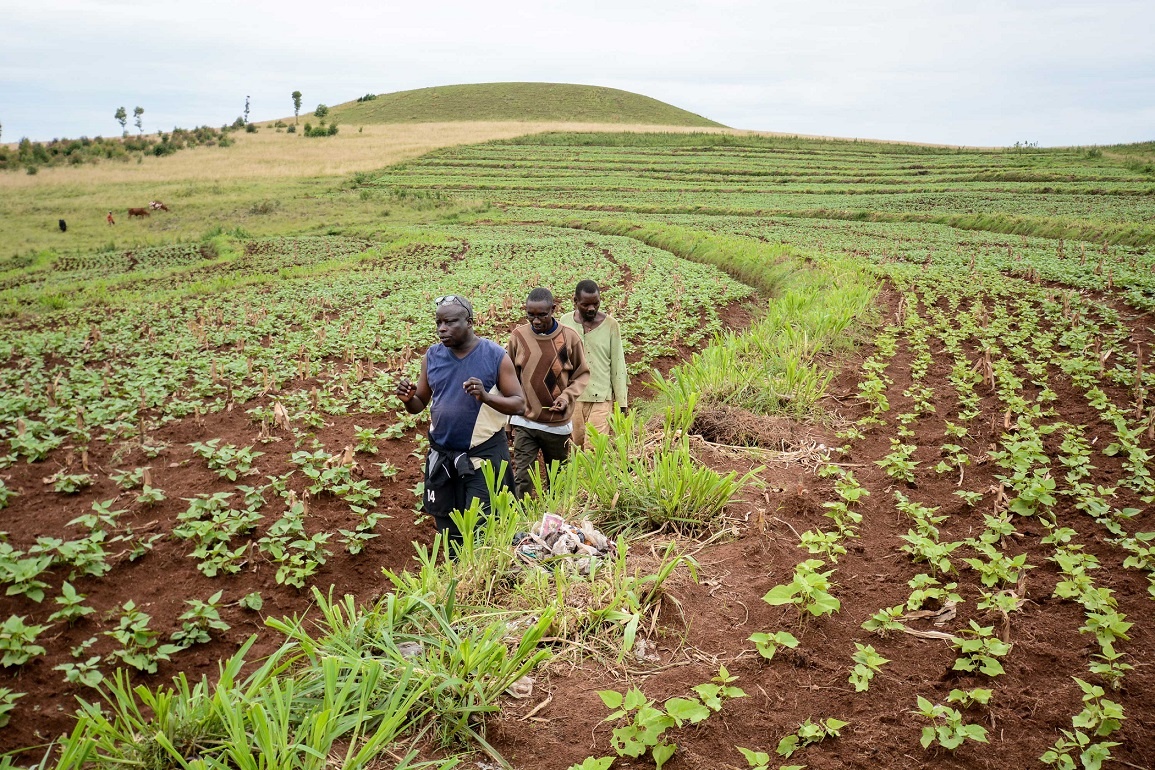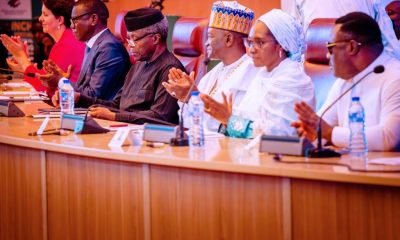Economy
Afe Babalola Donates N13.2m to Revamp Agriculture in Ekiti
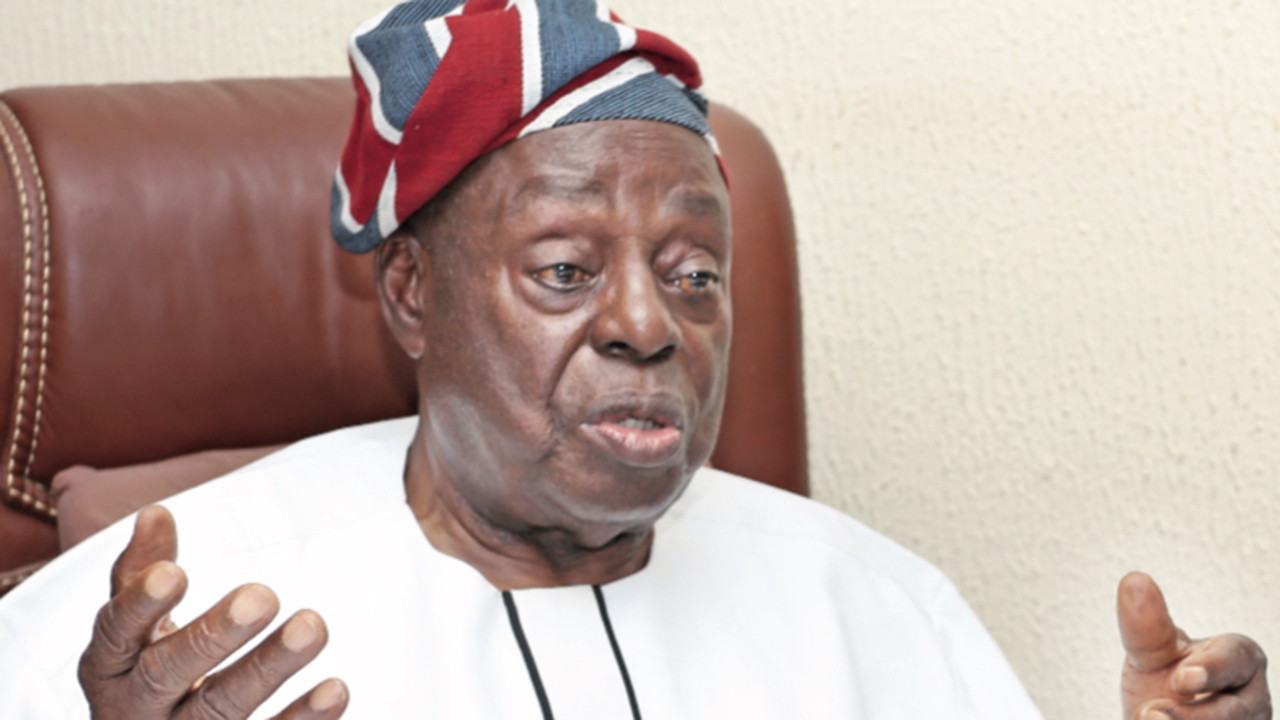
By Adedapo Adesanya
Legal luminary and educator, Mr Afe Babalola, has donated N13.2 million to outstanding farmers in Ekiti State as part of efforts to encourage farming and lift farmers financially.
Mr Babalola, who is also the founder of Afe Babalola University, Ado-Ekiti (ABUAD), is reputed to be the largest farmer and highest taxpayer in Ekiti State.
The gifting of money to farmers took place on Sunday at the grand finale of this year’s edition of the Annual Afe Babalola Agricultural Expo and The United Nations Educational, Scientific and Cultural Organization (UNESCO) Youth Empowerment, held at the university’s sports pavilion.
According to a statement, Mr Aribasoye Emmanuel, from Ado Local Government Area, got the star prize of N2 million as the overall best farmer in the state for the year.
The five best farmers in each of the 16 Local Government Areas in the state got N250,000, N150,000, N100,000, N75,000 and N50,000 respectively.
Mr Babalola said distributing money to hardworking farmers on annual basis was a fulfilment of his dream.
“This is in the realisation of my dream. It all started like a dream which translated into reality in 2015.
“The dream was my burning desire to make people realise that farming is a divine vocation.
“It is also part of my individual contributions to ongoing efforts at revitalising farming as well as reducing unemployment in the country.
“Another reason why I started this Expo was that I found it utmost painful that many Nigerians have abandoned farming for white-collar or menial jobs and also for no jobs.
“There was a time in this country when whatever one’s profession was, such a person would still have a small garden at the back of his house, if only for vegetables, tomatoes, pepper and garden eggs, among others,” he said.
He also used the opportunity to appeal to the federal government to establish a special Agriculture Bank, which will be completely different from those before it
He said the establishment of the structure would help farmers obtain loans at low-interest rates with their cooperative societies serving as guarantors.
He, however, expressed regret that farming in Nigeria has suddenly become abandoned and unattractive.
“Farming has been abandoned in Nigeria today and Nigeria is the worse for it.
“For instance, there was a time when Ekiti State alone was producing 52 per cent of the Internally-Generated Revenue (IGR) of the defunct Western Region.
“Today, Ekiti State is the poorest state in Nigeria. In fact, there was no beggar in Ekiti State at that time as everyone was gainfully employed, but today beggars are found everywhere.
“Regretfully, Ekiti State has become the poverty capital of Nigeria,” Mr Babalola bemoaned.
“Also, no thanks to the spate of insecurity ranging from kidnapping, robbery and invasion by herdsmen ravaging the country, life is no longer safe at home, on the farm, on the road or even in classrooms.
“The combination of these ills has led many farms to be destroyed with many farmers having to abandon their farms.
“Despite all these, Ekiti State farmers have been able to forge ahead. I believe in farming because I grew up on the farm and I am still a farmer as many of you know,” he said.
He added that he included the study of agriculture in the curriculum of his university, with a 50 per cent slash in tuition fee for the course.
“In my university, we provide seed money for graduates of agriculture to start their own businesses.
“That was why in addition to all of these, in 2015, I thought of how to improve the lot of our farmers.
“That is why I started this programme. I started with a prize of N5 million, but it has risen over the years, thus this year, we are giving out N13.2 million,” he said.
The Local Organising Committee Chairman and UNESCO Chair in Entrepreneurship Education for Sustainable Development, Mr Abiodun Ojo, also made a donation of 48 spraying machines to select farmers.
He said that partnering with ABUAD was to commend the good work which Aare Afe Babalola was doing to return agriculture to its old days of glory.
Mr Olugbenga Odesanmi, Permanent Secretary, Ministry of Agriculture, Ekiti State commended Babalola’s efforts and promised the government’s enabling environment at all times.
On her part, the Acting Vice-Chancellor of ABUAD, Professor Smaranda Olarinde, appreciated the founder’s gesture to farmers.
She said that the best way the beneficiaries could show gratitude to him was to invest wisely, the monies received so they would be able to fend for themselves and also provide employment for others.
Economy
Naira Down Again at NAFEX, Trades N1,359/$1

By Adedapo Adesanya
The Naira further weakened against the Dollar in the Nigerian Autonomous Foreign Exchange Market (NAFEX) for the fourth straight session this week on Thursday, February 26.
At the official market yesterday, the Nigerian Naira lost N3.71 or 0.27 per cent to trade at N1,359.82/$1 compared with the previous session’s N1,356.11/$1.
In the same vein, the local currency depreciated against the Pound Sterling in the same market window on Thursday by N8.27 to close at N1,843.23/£1 versus Wednesday’s closing price of N1,834.96/£1, and against the Euro, it crashed by N8.30 to quote at N1,606.89/€1, in contrast to the midweek’s closing price of N1,598.59/€1.
But at the GTBank forex desk, the exchange rate of the Naira to the Dollar remained unchanged at N1,367/$1, and also at the parallel market, it maintained stability at N1,365/$1.
The continuation of the decline of the Nigerian currency is attributed to a surge in foreign payments that have outpaced the available Dollars in the FX market.
In a move to address the ongoing shortfall at the official window, the Central Bank of Nigeria (CBN) intervened by selling $100 million to banks and dealers on Tuesday.
However, the FX support failed to reverse the trend, though analysts see no cause for alarm, given that the authority recently mopped up foreign currency to achieve balance and it is still within the expected trading range of N1,350 and N1,450/$1.
As for the cryptocurrency market, major tokens posted losses over the last 24 hours as traders continued to de-risk alongside equities following Nvidia’s earnings-driven pullback, with Ripple (XRP) down by 2.7 per cent to $1.40, and Dogecoin (DOGE) down by 1.6 per cent to $0.0098.
Further, Litecoin (LTC) declined by 1.3 per cent to $55.87, Ethereum (ETH) slipped by 0.9 per cent to $2,036.89, Bitcoin (BTC) tumbled by 0.7 per cent to $67,708.21, Cardano (ADA) slumped by 0.6 per cent to $0.2924, and Solana (SOL) depreciated by 0.4 per cent to $87.22, while Binance Coin (BNB) gained 0.4 per cent to sell for $629.95, with the US Dollar Tether (USDT) and the US Dollar Coin (USDC) closing flat at $1.00 each.
Economy
Crude Oil Falls as Geopolitical Risk Around Iran Clouds Supply Outlook

By Adedapo Adesanya
Crude oil settled lower on Thursday as investors tracked developments in talks between the United States and Iran over the latter’s nuclear programme, weighing potential supply concerns if hostilities escalate.
Brent crude futures lost 10 cents or 0.14 per cent to close at $70.75 a barrel, while the US West Texas Intermediate (WTI) crude futures depreciated by 21 cents or 0.32 per cent to $65.21 a barrel.
The US and Iran held indirect talks in Geneva on Thursday over their long-running nuclear dispute to avert a conflict after US President Donald Trump ordered a military build-up in the region.
Prices had gained earlier in the session after media reports indicated the talks had stalled over US insistence on zero enrichment of uranium by Iran, as well as a demand for the delivery of all 60 per cent-enriched uranium to the US.
However, prices then retreated after the two countries extended talks into next week, reducing the immediate strike potential.
Iran’s Foreign Minister, who confirmed talks will continue next week, said Thursday’s talks were the most serious exchanges with the US yet, saying Iran clearly laid out its demand for lifting sanctions and the process for relief.
His counterpart from Oman, who is handling the talks, said significant progress was made in Thursday’s talks. The Omani minister’s upbeat assessment followed indirect talks between Iranian Foreign Minister and US envoys Steve Witkoff and Jared Kushner in Geneva, with one session in the morning and the second in the afternoon.
He will also hold talks with US Vice President JD Vance and other US officials in Washington on Friday.
The Trump administration has insisted that Iran’s ballistic missile program and its support for armed groups in the region must be part of the negotiations.
The American President said on February 19 that Iran must make a deal in 10 to 15 days, warning that “really bad things” would otherwise happen.
On Tuesday, he briefly laid out his case for a possible attack on Iran in his State of the Union speech, underlining that while he preferred a diplomatic solution, he would not allow Iran to obtain a nuclear weapon.
Meanwhile, the US continues to amass forces in the Middle Eastern region, with the military saying it is prepared to execute orders given by the US President.
Economy
Why Transparency Matters in Your Choice of a Financial Broker

Choosing a Forex broker is essentially picking a partner to hold the wallet. In 2026, the market is flooded with flashy ads promising massive leverage and “zero fees,” but most of that is just noise. Real transparency is becoming a rare commodity. It isn’t just a corporate buzzword; it’s the only way a trader can be sure they aren’t playing against a stacked deck. If a broker’s operations are a black box, the trader is flying blind, which is a guaranteed way to blow an account.
The Scam of “Zero Commissions”
The first place transparency falls apart is in the pricing. Many brokers scream about “zero commissions” to get people through the door, but they aren’t running a charity. If they aren’t charging a flat fee, they are almost certainly hiding their profit in bloated spreads or “slippage.” A trader might hit buy at one price and get filled at a significantly worse one without any explanation. This acts as a silent tax on every trade. A transparent broker doesn’t hide the bill; they provide a live, auditable breakdown of costs so the trader can actually calculate their edge.
The Conflict of Market Making
It is vital to know who is on the other side of the screen. Many brokers act as “Market Makers,” which is a polite way of saying they win when the trader loses. This creates a massive conflict of interest. There is little incentive for a broker to provide fast execution if a client’s profit hurts their own bottom line. A broker with nothing to hide is open about using an ECN or STP model, simply passing orders to the big banks and taking a small, visible fee. If a broker refuses to disclose their execution model, they are likely betting against their own clients.
Regulation as a Safety Net
Transparency is worthless without an actual watchdog. A broker that values its reputation leads with its licenses from heavy-hitters like the FCA or ASIC. They don’t bury their regulatory status in the fine print or hide behind “offshore” jurisdictions with zero oversight. More importantly, they provide proof that client funds are kept in segregated accounts. This ensures that if the broker goes bust, the money doesn’t go to their creditors—it stays with the trader. Without this level of openness, capital is essentially unprotected.
The Withdrawal Litmus Test
The ultimate test of a broker’s transparency is how they handle the exit. There are countless horror stories of traders growing an account only to find that “technical errors” or vague “bonus terms” prevent them from withdrawing their money. A legitimate broker has clear, public rules for getting funds out and doesn’t hide behind a wall of unreturned emails. If a platform makes it difficult to see the exit strategy, it’s a sign that the front door should have stayed closed.
Conclusion
In 2026, honesty is the most valuable feature a broker can offer. It is the foundation that allows a trader to focus on the charts instead of worrying if their stops are being hunted. Finding a partner with clear pricing, honest execution, and real regulation is the first trade that has to be won. Flashy marketing is easy to find, but transparency is what actually keeps a trader in the game for the long haul.
-

 Feature/OPED6 years ago
Feature/OPED6 years agoDavos was Different this year
-
Travel/Tourism10 years ago
Lagos Seals Western Lodge Hotel In Ikorodu
-

 Showbiz3 years ago
Showbiz3 years agoEstranged Lover Releases Videos of Empress Njamah Bathing
-

 Banking8 years ago
Banking8 years agoSort Codes of GTBank Branches in Nigeria
-

 Economy3 years ago
Economy3 years agoSubsidy Removal: CNG at N130 Per Litre Cheaper Than Petrol—IPMAN
-

 Banking3 years ago
Banking3 years agoSort Codes of UBA Branches in Nigeria
-

 Banking3 years ago
Banking3 years agoFirst Bank Announces Planned Downtime
-

 Sports3 years ago
Sports3 years agoHighest Paid Nigerian Footballer – How Much Do Nigerian Footballers Earn


